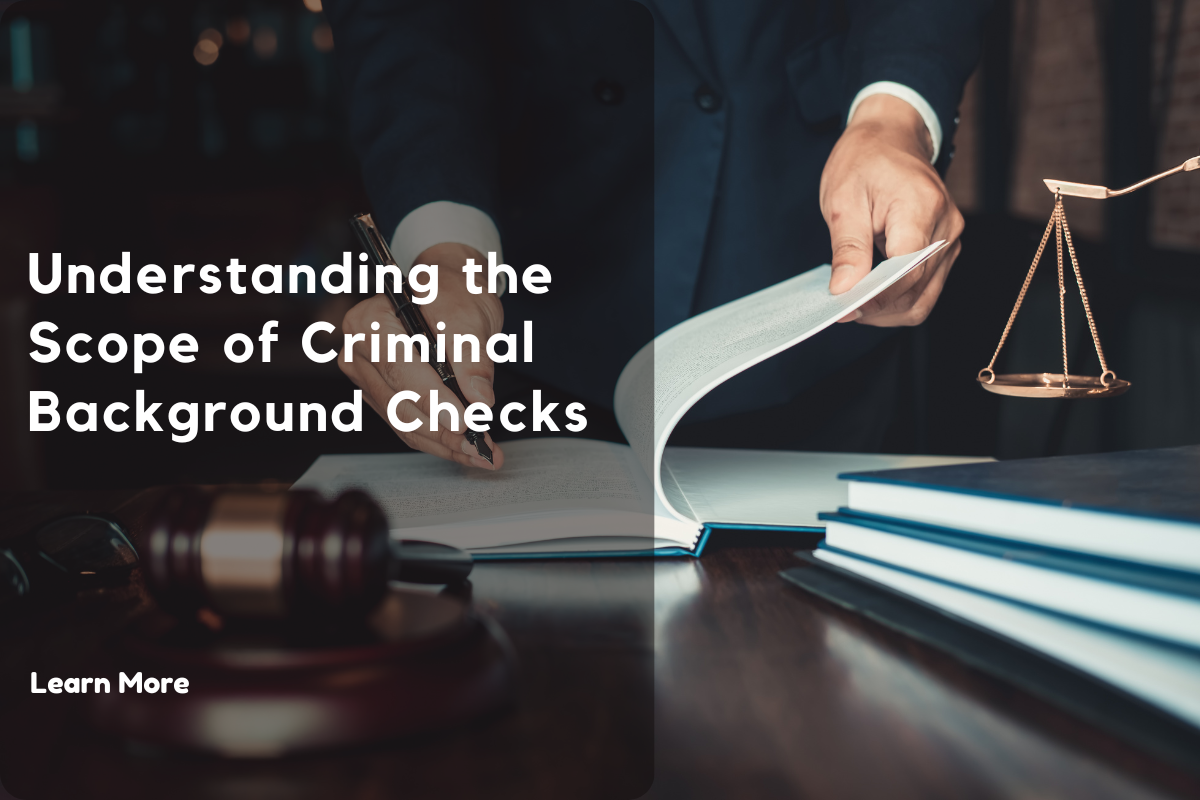 Introduction to Criminal Background Checks and What They Involve
Introduction to Criminal Background Checks and What They Involve
A criminal background check is an essential tool used by various entities, including employers, landlords, and government agencies, to assess an individual’s criminal history and ensure safety and compliance. It provides valuable information that helps to make informed decisions regarding employment, housing, and legal matters. Understanding how far a criminal background check goes and what it involves is critical for individuals undergoing background checks as well as organizations conducting them.
What Is a Criminal Background Check?
A criminal background check is a process in which an individual’s criminal history is examined by searching databases, court records, and other available public sources. This check typically includes information about criminal offenses such as felonies, misdemeanors, arrests, convictions, and any ongoing legal proceedings. It’s used to assess whether an individual has a history of criminal activity, which may raise concerns regarding their fitness for a particular job, position, or responsibility.
For employers, criminal background checks are essential in safeguarding the workplace, ensuring a safe environment, and minimizing liability risks. Landlords use them to assess whether potential tenants have a history that could pose a threat to others or damage property. Similarly, criminal background checks are frequently required in situations such as applying for a license, adopting a child, or even obtaining a visa. Given the vast array of applications, criminal background checks have become an integral part of modern-day decision-making.
Why Are Criminal Background Checks Important?
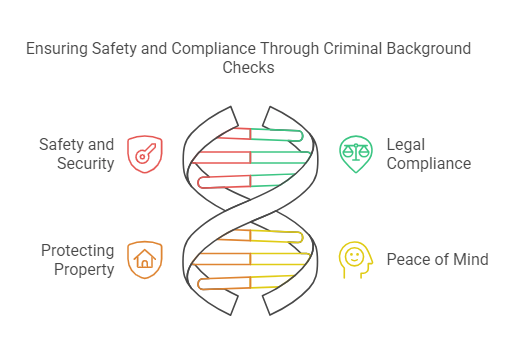
The primary reason criminal background checks are so widely used is their role in helping to protect people, organizations, and communities from potential harm. Here are some key reasons why background checks are conducted:
- Safety and Security: Employers, especially in industries like healthcare, education, and transportation, rely on background checks to ensure they are hiring candidates who do not have a history of violent crimes or illegal activities. In the same vein, landlords use background checks to ensure the safety of their other tenants.
- Legal Compliance: Certain industries and professions, such as healthcare, childcare, and finance, require background checks to meet regulatory standards and legal obligations. Failure to comply with these requirements could result in fines or the loss of a business license.
- Protecting Property: Landlords use background checks to determine whether potential tenants have a history of property damage or lease violations. Similarly, employers may check backgrounds to assess whether applicants have engaged in theft or fraud in previous positions.
- Peace of Mind: Individuals also benefit from criminal background checks, especially when they are involved in hiring or tenancy decisions. A clean criminal record provides peace of mind that one is hiring or renting to trustworthy individuals.
What Does a Criminal Background Check Include?
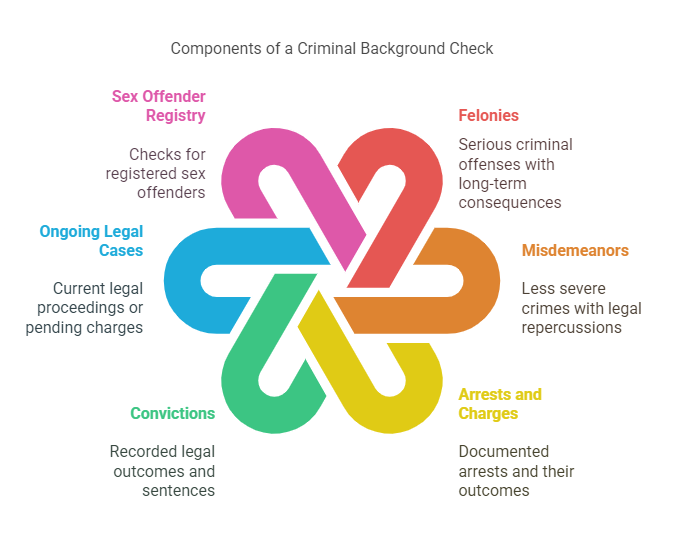
A criminal background check typically involves an in-depth review of an individual’s criminal history, and the types of information it uncovers can vary depending on the nature of the check. The following are the key components generally included:
- Felonies: These are serious criminal offenses, including violent crimes (such as murder, rape, and assault), drug trafficking, and white-collar crimes (such as fraud, embezzlement, or money laundering). Felonies often come with long-term consequences and severe penalties, and they tend to stay on a person’s record for an extended period, even for life in some cases.
- Misdemeanors: Misdemeanors are less severe crimes but still have legal consequences. These offenses can include petty theft, vandalism, simple assault, or public intoxication. Misdemeanors usually result in lighter penalties, such as short jail sentences or fines, but may still be relevant to background checks, depending on the situation.
- Arrests and Charges: Arrests are often documented in criminal background checks, regardless of whether the individual was convicted. Arrests are not necessarily an indication of guilt, but they can provide insights into the individual’s history. Charges that did not result in conviction may still appear on a background check, depending on the check’s scope.
- Convictions: If a person has been convicted of a crime, the conviction will be recorded and included in the criminal background check. Convictions typically include the charge, the legal outcome, and the associated sentence. Convictions for serious crimes, such as violent offenses or drug trafficking, may have long-term implications for employment or housing opportunities.
- Ongoing Legal Cases: Some criminal background checks may reveal ongoing legal proceedings or pending charges if the information is publicly available within a jurisdiction. These checks can provide valuable context about whether the individual is currently involved in criminal activity or facing legal challenges.
- Sex Offender Registry: In some cases, a criminal background check will also check for any involvement in the Sex Offender Registry if the individual is legally required to be listed. This is particularly important for employers and landlords who want to ensure the safety of their clients, employees, or tenants.
Types of Criminal Background Checks
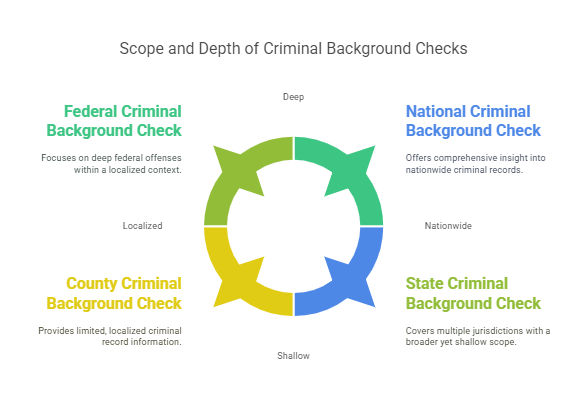
There are several types of criminal background checks, each focusing on different levels of investigation and jurisdiction. Understanding these checks is crucial for both individuals and organizations to know how far a criminal background check can go:
- County Criminal Background Check: This is the most localized type of background check, focused on criminal records within a specific county’s jurisdiction. It is typically the most affordable type of check, but it only provides a limited scope of information relevant to that county.
- State Criminal Background Check: Statewide checks are more comprehensive than county checks and involve searching through records across an entire state. A state criminal background check may provide more detailed information than a county check, including records from multiple jurisdictions within the state.
- Federal Criminal Background Check: A federal criminal check looks for offenses that are under federal jurisdiction, such as large-scale drug trafficking or white-collar crimes. It typically uncovers information related to federal offenses and is particularly useful for industries with high-security needs or positions involving federal regulations.
- National Criminal Background Check: A national criminal background check provides the most comprehensive search, examining records from across the entire United States. These checks are broader in scope and can include information from federal, state, and county databases, offering a nationwide perspective on an individual’s criminal history.
How Far Does a Criminal Background Check Go?
The depth of a criminal background check depends on several key factors:
- Time Frame: Criminal background checks typically look back over a set period. Employment background checks may focus on the past 7 to 10 years of criminal history, though certain serious offenses (such as felonies) can remain on an individual’s record for much longer. Some checks might even include records that go back indefinitely, depending on the nature of the offense.
- Geographic Scope: The location of the background check also plays a critical role in determining how far it goes. For example, a county background check will only pull records from a specific county, while a state or national check can encompass a much broader geographic area.
- Type of Offense: Serious offenses, such as felonies, are more likely to be included in the check regardless of when they occurred, while minor offenses or misdemeanors may not show up on some background checks after a certain period, particularly for jobs that only require a limited scope of history.
- Access to Records: The type of background check requested determines how far back and how deeply a service provider will look. More detailed checks, such as federal and national checks, typically uncover more information, while local checks may be limited to more recent records and a smaller geographical area.
The range of a criminal background check, in terms of both time and geography, ultimately depends on the service provider and the requirements of the entity conducting the check. Employers, landlords, and other organizations may tailor their background check policies to suit their particular needs and concerns.
Factors That Affect How Far a Criminal Background Check Goes
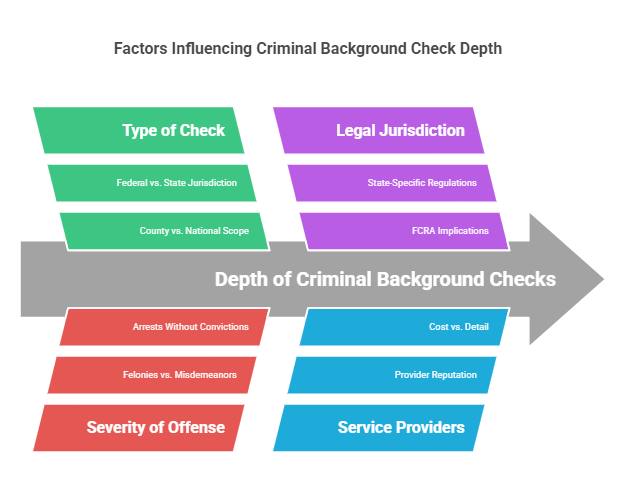
The depth and breadth of a criminal background check can vary widely depending on several factors. Understanding these factors is critical for both individuals who may undergo a background check and entities conducting them. These elements can impact not only how far back a criminal record is investigated but also the geographical scope and the level of detail involved in the process.
Type of Criminal Background Check
The type of criminal background check being conducted is one of the most significant factors that determines how far the check goes. As mentioned in Part 1, there are several types of criminal background checks, each with a different level of scope and detail:
- County Criminal Background Check: This is the most localized form of a background check, focused on criminal records within a specific county. While a county-level background check can provide detailed information about a person’s criminal history within that jurisdiction, it will not account for offenses that may have occurred in other counties or states. Therefore, the geographical reach of this check is limited, and its depth is confined to the records within the county.
- State Criminal Background Check: Statewide checks cover criminal offenses committed across the entire state, including multiple counties. These checks are more comprehensive than county checks because they provide information from a broader jurisdiction. However, it’s important to note that state criminal checks may not include federal offenses or those from other states, which could limit their reach depending on the scope of the check.
- Federal Criminal Background Check: Federal background checks focus on crimes that fall under federal jurisdiction, such as large-scale fraud, drug trafficking, or offenses related to interstate commerce. This type of check can reveal serious crimes that may not appear in county or state checks, as it looks for violations of federal laws. However, it will not include state or local offenses, which may make it less comprehensive in certain situations.
- National Criminal Background Check: National checks pull records from multiple databases across the entire country, offering the broadest scope of any criminal background check. This check may include data from county, state, and federal levels, allowing for a comprehensive view of an individual’s criminal history across jurisdictions. However, despite its broad reach, national checks can still vary in terms of depth depending on the service provider and the databases they access.
Severity of the Offense
The severity of the criminal offense plays a major role in determining how far back a criminal background check goes. More serious crimes, particularly felonies, tend to remain on a person’s record longer than less serious offenses. Here’s a breakdown of how different offenses are treated in background checks:
- Felonies: Felonies are the most severe criminal offenses, and they generally stay on an individual’s record for life. Criminal background checks will typically reveal felony convictions, regardless of when they occurred. Because of the serious nature of these offenses, they are more likely to be included in checks, especially in cases where the individual is applying for high-security positions or roles that require a thorough vetting process.
- Misdemeanors: Misdemeanors, while less severe than felonies, may also appear in a criminal background check. These offenses can include crimes like petty theft, public intoxication, or simple assault. Depending on the state or employer’s policies, misdemeanors may appear on a background check for a shorter time frame than felonies. For example, some employers may only look at misdemeanor convictions from the past five to seven years, while others may disregard older offenses altogether. Misdemeanors typically have a less lasting impact on a person’s criminal record, but they can still be a factor in decision-making.
- Arrests Without Convictions: In some cases, an individual may have been arrested but not convicted of a crime. These arrests may still show up on a criminal background check, but they do not necessarily indicate guilt. Employers and other entities that conduct background checks may consider these arrests in context. However, in certain jurisdictions, arrests without convictions may be excluded from a background check after a specific time period or may be excluded altogether under certain circumstances, such as if the charges were dropped or the individual was acquitted.
- Expungements and Sealed Records: In some cases, individuals may have their criminal records expunged or sealed. Expungement refers to the legal process of erasing a criminal record, while sealing refers to restricting access to it. If a record has been expunged or sealed, it may not appear in a standard criminal background check. However, the availability of this information can vary depending on the laws of the jurisdiction conducting the background check. Some checks may still reveal sealed or expunged records, particularly for federal checks or specialized background screening services.
Legal Jurisdiction and Reporting Regulations
The jurisdiction conducting the criminal background check can also influence how far back a criminal history investigation goes. Different states, counties, and federal agencies have varying laws regarding the reporting of criminal records, including the length of time that certain offenses can be included in a background check.
- State-Specific Regulations: Each state has its own laws and regulations about how far back a criminal background check can go and what information can be included. For example, some states have laws that limit the reporting of certain types of convictions after a certain period of time, while others have no time limit on the disclosure of criminal history. Additionally, state laws may differ in how they treat certain offenses, such as drug-related crimes, or in how they handle expungements and sealed records.
- Fair Credit Reporting Act (FCRA): The Fair Credit Reporting Act (FCRA) is a federal law that governs how background checks can be used in employment, housing, and other decision-making processes. The FCRA imposes certain restrictions on how long criminal records can be reported. For example, in most cases, criminal convictions can be reported indefinitely, but arrests without convictions can only be reported for seven years. This regulation affects how far a background check goes when the results are used for hiring or housing decisions.
- Different Types of Employers: The type of employer conducting the check can also impact the depth of the investigation. Employers in highly regulated industries, such as healthcare or law enforcement, may require more detailed and far-reaching background checks, including checking federal and state records. On the other hand, employers in lower-risk industries may only conduct basic county or state checks.
Service Providers and the Cost of Background Checks
The service provider used to conduct the criminal background check can significantly affect how far the check goes. Different background check companies offer varying levels of detail, and the cost of the check may correlate with its depth. More thorough checks, such as national and federal background checks, tend to cost more due to the additional resources involved in gathering data from multiple jurisdictions.
Rapid Hire Solutions, for example, is a service provider that offers comprehensive criminal background checks with a focus on both accuracy and efficiency. They provide a range of checks, including local, state, and federal background checks, and help clients streamline the process of obtaining and interpreting results. Using a reputable provider like Rapid Hire Solutions can ensure that background checks are thorough, legally compliant, and appropriate for the specific needs of employers, landlords, or individuals seeking to verify a person’s criminal history.
Legal Aspects of Criminal Background Checks
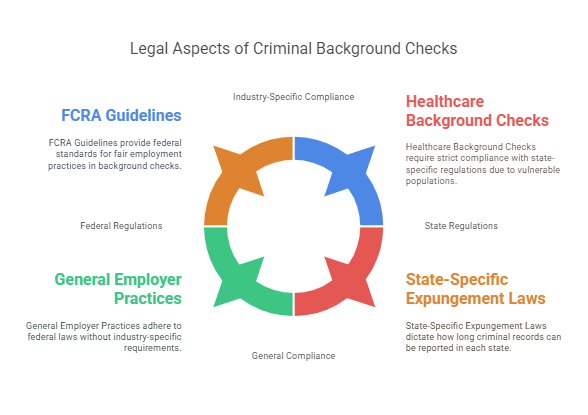
Criminal background checks are governed by various laws at the federal, state, and local levels. These legal frameworks aim to protect individuals’ rights while ensuring that employers, landlords, and other decision-makers can use criminal history information responsibly and fairly.
Fair Credit Reporting Act (FCRA)
The Fair Credit Reporting Act (FCRA) plays a critical role in governing how criminal background checks are used, especially in the context of employment. The FCRA stipulates certain rules regarding the reporting and use of criminal records in employment decisions. For example:
- Limitations on Reporting: The FCRA limits how far back certain criminal records can be reported, particularly in the case of arrests without convictions. In most cases, arrests that did not lead to a conviction can only be reported for seven years. On the other hand, felony convictions can be reported indefinitely.
- Employer Disclosure Requirements: Employers must inform candidates if they plan to use a background check in their hiring process. They must also obtain written consent from the candidate before conducting the background check. If the employer decides not to hire a candidate based on the results of the background check, they must provide the individual with a copy of the report and a notice of the decision.
- Adverse Action: If an employer takes adverse action based on the results of a criminal background check, they must follow a specific process. This includes providing the applicant with a pre-adverse action notice, followed by the actual adverse action notice if the employer proceeds with their decision.
State-Specific Regulations
Each state has its own regulations concerning criminal background checks, which can differ from federal laws. These regulations address various aspects, including:
- Ban the Box Laws: Some states and localities have passed “Ban the Box” laws, which prohibit employers from asking about a candidate’s criminal history on job applications. This legislation aims to give individuals with criminal records a fair chance at employment by ensuring that their qualifications are considered first.
- Time Limits on Reporting: Some states restrict how far back criminal records can be included in background checks. For example, in California, most criminal convictions can only be reported for seven years, while in other states, the limit may be 10 years. The duration can depend on the nature of the crime and the state’s regulations.
- Expungement and Sealing of Records: Many states allow individuals to expunge or seal certain criminal records after a set period. When records are expunged or sealed, they are typically excluded from criminal background checks. However, certain crimes, like violent offenses, may not be eligible for expungement or sealing, depending on state law.
- Juvenile Records: In most states, juvenile records are generally sealed and not accessible in criminal background checks, except in specific cases, such as when the individual is being tried as an adult or the offense is particularly severe.
Compliance with Industry-Specific Regulations
In some industries, there are stricter regulations regarding background checks due to the sensitive nature of the work involved. For example:
- Healthcare Industry: Healthcare employers may be required to conduct more extensive background checks due to the vulnerable population they serve. This could include checks for drug convictions, fraud, and other offenses that might not be included in standard checks.
- Financial Sector: Financial institutions and companies in the banking sector must ensure their employees are free from financial crimes, like embezzlement or money laundering. As a result, financial institutions often require comprehensive background checks to screen for any criminal offenses related to financial misconduct.
- Transportation Industry: Commercial drivers are often required to undergo thorough background checks, including federal and state-level checks. This is due to the safety-sensitive nature of transportation jobs, which require individuals to have clean driving records and no history of serious offenses like DUI or reckless driving.
Frequently Asked Questions (FAQs)
Here are some common questions regarding criminal background checks and how far they go:
How far back do criminal background checks go in employment?
Criminal background checks typically go back seven years for misdemeanors and up to 10 years or more for felony convictions. However, the duration can vary depending on the state and the nature of the offense. Employers may also look back further for certain high-security positions or jobs requiring a higher level of scrutiny.
Can a background check include juvenile records?
In most cases, juvenile records are sealed and not included in criminal background checks. However, certain serious offenses or situations, such as being tried as an adult, may lead to juvenile records being included. Employers in some industries may also have access to sealed juvenile records in specific circumstances.
Do criminal background checks vary by state?
Yes, criminal background checks can vary significantly by state. Each state has its own laws governing what can be included in a background check, how far back it can go, and the circumstances under which criminal records can be expunged or sealed. It’s important to be aware of state-specific laws when conducting background checks.
Can employers see arrests without convictions?
In many cases, employers can see arrests that occurred without a conviction, but these are often not given the same weight as convictions. Arrests without convictions may be excluded from background checks in certain states or after a specified period, depending on the state’s regulations. However, employers may still take them into consideration depending on the nature of the job.
How long does a criminal record stay on file?
A criminal record can stay on file indefinitely. Felony convictions, in particular, are generally permanent, unless expunged or sealed. Misdemeanors may be removed after a set period depending on the state’s laws, and arrests without convictions can be reported for up to seven years in most cases.
Conclusion
In conclusion, understanding how far a criminal background check goes is crucial for both individuals undergoing background checks and employers conducting them. The scope of a criminal background check is influenced by several factors, including the type of check, the severity of the offenses, the jurisdiction, and relevant state and federal regulations. By staying informed about these aspects, individuals and employers can ensure that they are in compliance with legal requirements while making informed decisions based on a person’s criminal history.
Service providers like Rapid Hire Solutions can help individuals and employers access thorough and legally compliant criminal background checks. With the right knowledge and resources, you can ensure that the background check process is both accurate and fair, protecting both individuals’ rights and the interests of employers and other entities.
